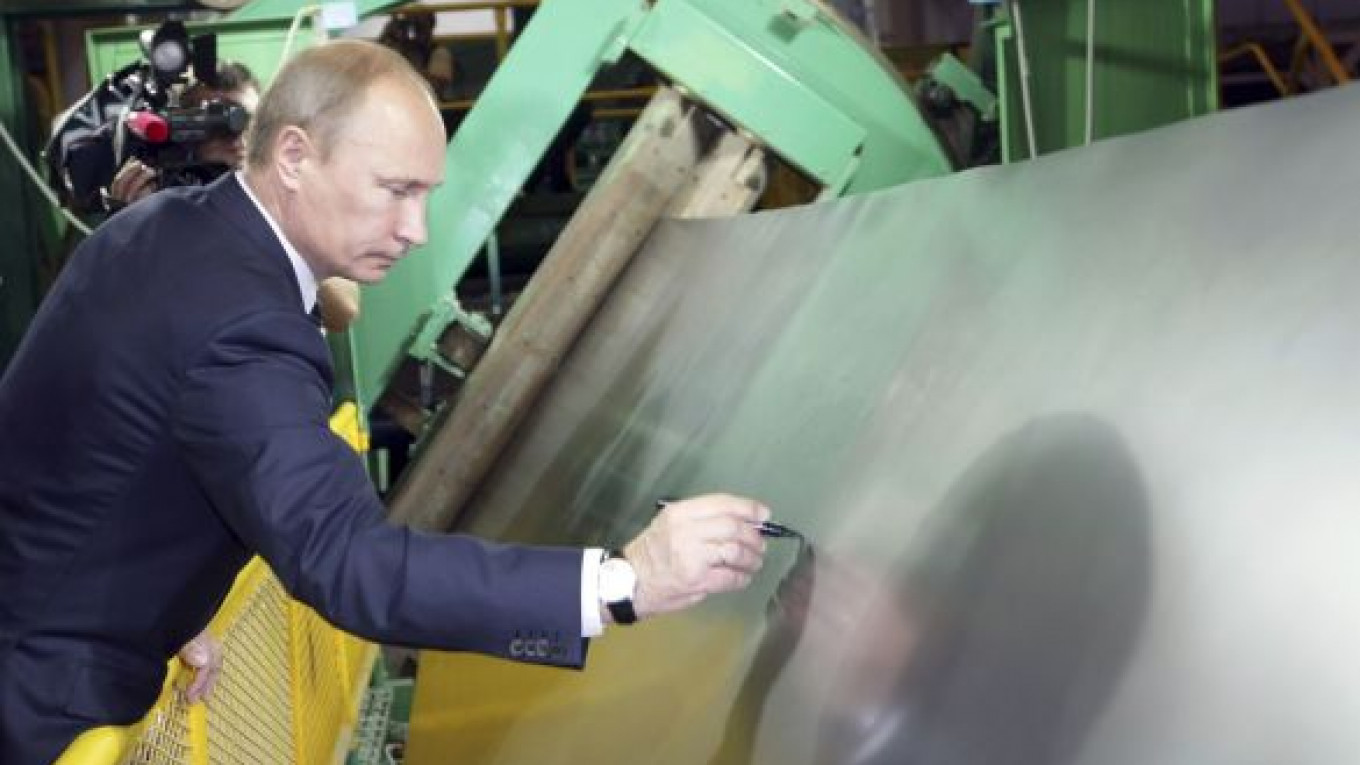Prime Minister Vladimir Putin opened Magnitogorsk Iron & Steel's new $1.5 billion mill Friday as the country's largest standalone steel plant seeks to gain from increased demand from carmakers.
The mill will make high-quality steel, targeting local and foreign automakers and producers of home appliances, the steelmaker — also known as MMK — said on its web site Friday.
The mill may produce 160,000 metric tons of cold-rolled steel this year and 1.5 million tons in 2012, Sergei Laskov, who runs the facility, told reporters. Capacity should reach 2.1 million tons next year, he said.
The steel producer controlled by Viktor Rashnikov is betting on rising sales as Russia requires foreign carmakers that set up plants in the country to source much of their product content locally.
MMK wants the mill to substitute imports from ThyssenKrupp and Posco, Laskov said. Renault, Nissan Motor and Volkswagen are among carmakers to show interest in using output from the mill, while its first steel will be shipped to domestic automaker AvtoVAZ, he said.
Scores of foreign carmakers have opened plants in Russia in the past decade, hoping to cash in on a market that is on track to become Europe's largest. Sales in Russia rose 56 percent, to 1.2 million, in January-June, according to the Association of European Businesses in Russia. Nine out of 10 best sellers were produced domestically.
Russia may become the world's sixth-largest auto market in 2020, with annual sales of 4 million vehicles, the Boston Consulting Group said in a January report. The nation is currently the 10th largest, according to the consulting firm.
But as the foreign majors started to reap profits from the market that local producers were unable to satisfy, the government launched a campaign to couple up struggling Russian plants with foreign majors and push them to produce parts in Russia.
Most carmakers operating in Russia have signed deals with the government, committing to invest millions of dollars in exchange for low import duties. Among them are General Motors, Ford, Volkswagen, Renault-Nissan, Fiat and other global majors.
Russians generally prefer foreign brands, and complaints of the poor quality of Russian cars abound, but the government has been propping up struggling and loss-making carmakers for years.
The government provided a much criticized $1 billion bailout to save troubled carmaker AvtoVAZ after requiring that the plant modernize its products. Critics say AvtoVAZ's cars still have a long way to go to be competitive with cheaper and more reliable Korean and Chinese cars.
Hot-rolled products made up 63 percent of Magnitogorsk's sales last year, with cold-rolled products taking an 11 percent share, the company has said.
In briefing materials on the launch of the new unit, the company said it would provide an "economic effect" of 11 billion rubles ($391.2 million) per year and had a payback period of four years.
(Bloomberg, AP, Reuters)
A Message from The Moscow Times:
Dear readers,
We are facing unprecedented challenges. Russia's Prosecutor General's Office has designated The Moscow Times as an "undesirable" organization, criminalizing our work and putting our staff at risk of prosecution. This follows our earlier unjust labeling as a "foreign agent."
These actions are direct attempts to silence independent journalism in Russia. The authorities claim our work "discredits the decisions of the Russian leadership." We see things differently: we strive to provide accurate, unbiased reporting on Russia.
We, the journalists of The Moscow Times, refuse to be silenced. But to continue our work, we need your help.
Your support, no matter how small, makes a world of difference. If you can, please support us monthly starting from just $2. It's quick to set up, and every contribution makes a significant impact.
By supporting The Moscow Times, you're defending open, independent journalism in the face of repression. Thank you for standing with us.
Remind me later.






